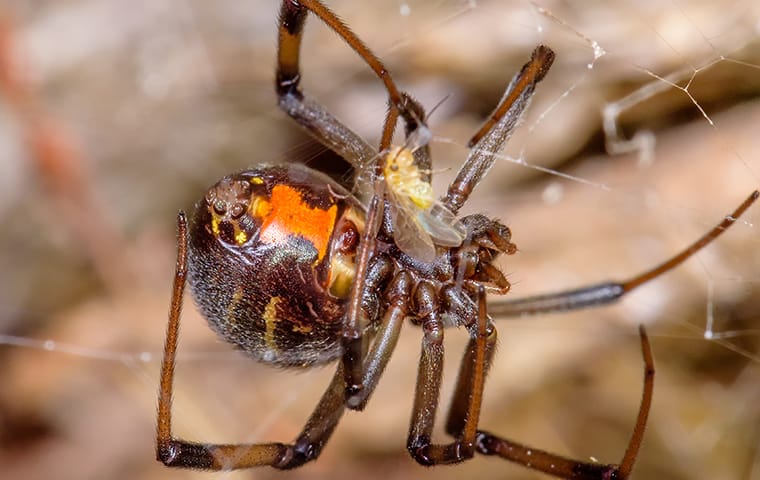What are spiders?
Unlike insects that have three body regions and six legs, spiders are arachnids and have two body regions with eight legs. Spiders lack antennae and wings, but they do have fangs (chelicerae) that they use to inject venom into their prey. These environmentally beneficial pests keep populations of garden insects and nuisance pests in checks. Most spiders home and business owners will come into contact with are nuisance pests and pose no harm, but some are dangerous pests.

The types of dangerous spiders living in our area include the following:
Black widow spiders
Black widow spiders are well-known for having a unique orange-red "hourglass" mark on the underside of their abdomen. This marking signals danger to predators. Their round body is shiny black, and their legs are very thin.
Brown widow spiders
These spiders are brown or tan with a white geometric pattern on the upper side of their abdomen. They also have an hourglass marking on the underside. Instead of a red marking like the black widow spider, the brown widow spider's marking is orange or yellow.
Are spiders dangerous in North Augusta, SC?
Both black and brown widow spiders can be dangerous, and both possess potent venom that is strong enough to cause health problems in humans. However, the venom of a brown widow spider is less potent than that of the black widow. Fortunately, neither spider is particularly aggressive towards people, and most bites occur when the spiders are unknowingly squished or pinched. An interesting fact about brown widows is that they are quite aggressive towards black widows and have been known to drive them away.
Why do I have a spider problem in North Augusta, SC?
The insects that are living on your property are the main reason that spiders will call your it their home. Large populations of insects provide spiders with an endless supply of food. Spiders mainly live outdoors but often find their way into your home or business while hunting for food or if the weather becomes too cold, hot, or wet to live comfortably.
Where will I find spiders in Aiken, SC?
Both brown widows and black widows prefer to place their messy, irregular-shaped webs at ground level. Areas under woodpiles, outdoor furniture, and decks are where these spiders are commonly found. Areas that you'll find other spiders building their webs or burrows include bushes, gardens, overgrown vegetation, and tall grasses, as well as in garages, sheds, and other outbuildings. Indoors, spiders take up residence in quiet, low-traffic areas like attics, basements, closets, storage boxes, and under furniture.
How do I get rid of spiders in Graniteville, SC?
For home and business owners who want to eliminate spiders from their property, partnering with a professional is the best way to be successful. At Jury Pest Services, we provide exceptional pest solving strategies that will eliminate spiders and prevent their return. Our green pest control solutions protect the environment, while still being effective against our area’s toughest pests. Serving Richmond County in Georgia and Aiken County in South Carolina, Jury Pest Services is committed to our customers and to providing trustworthy pest control services. We also provide our professional services to homes and businesses in Columbia County, GA, Edgefield County, SC, Barnwell County, SC, and beyond. To learn more about our spider control services, contact Jury Pest Services today!
How can I prevent spiders in the future in North Augusta, SC?
In addition to the professional solutions found at Jury Pest Services, use the following tips to help prevent problems with spiders:
-
Keep spiders out of your home or business by sealing openings in the foundation, exterior walls, and roofline.
-
Keep the doors of garages and other buildings shut when not in use.
-
Make sure that window and door screens are entirely intact.
-
Keep the grass cut short.
-
Eliminate water sources inside and outside your property.
-
Remove excess piles of wood and other clutter from your property.
-
Cut back tree branches, shrubs, and bushes from the exterior of your property.
-
Keep storage areas clutter-free and store items inside plastic containers with locking lids instead of cardboard boxes.
Schedule An Inspection Today!
Complete the form below to request an inspection.
 Reviews
Reviews